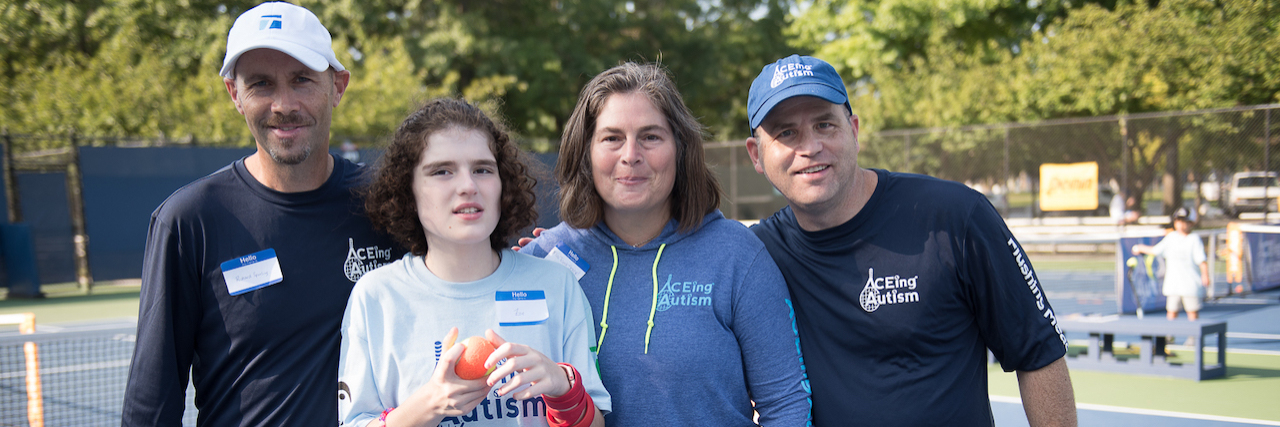by Mira Tamir Spiegel
“What does she do for fun?” Zoe’s neurologist, Dr. Jeste, asked during our first appointment.
It was like reliving that moment when you realized the test was on the one thing you hadn’t studied. I had a 4-year-old — and I couldn’t answer that simple question.
Two years earlier, my husband and I had taken Zoe to a developmental pediatrician. We half-expected the doctor would laugh in our faces, call us hysterical first-time parents and send us home with a lecture about how speech delays run in families and how we just needed to chill out.
Only this doctor didn’t laugh in our faces and she didn’t tell us to chill out. Instead, she told us how she never diagnoses autism on a first visit, but it was so abundantly clear, and we didn’t have a minute to lose. We walked out of her office that day with an impossible to-do list of agencies to contact, therapies to secure and a whole new outlook — one that was focused almost exclusively on our daughter’s deficits.
From there, we fell into every possible trap. If it didn’t have the word therapy in it, it wasn’t for Zoe. What’s worse, and a little hard to admit, is that we actually started to feel like Zoe wasn’t entitled to the same things as other kids — like fun or sports — even though that was what we had always imagined for her. She just had too much work to do and that’s all we could think about.
Dr. Jeste used my silence to tell us she was co-founding a new program called ACEing Autism that would make tennis accessible to kids with ASD and her co-founder, Richard Spurling, was looking for kids to help pilot it. As a former college tennis player, I couldn’t say yes fast enough.
Richard invited me to bring Zoe to the private suburban country club where he was the tennis pro. I still remember grabbing Zoe’s hand so tightly and the bewildered look on her face as I pulled her across the parking lot. I so badly wanted this to be successful. My mind wandered to both possible outcomes. What if…
My mind didn’t get the chance to wander very far. That first lesson felt like a disaster; we couldn’t get Zoe’s attention and she kept trying to bolt and taste the clay from the court. I spent the whole time thinking up excuses because I was so sure Richard would say those dreaded words that had become all too familiar, “Maybe she’s just not ready.”
Imagine my surprise when Richard said, “I think that was a good start. Will you come back next week?”
And so we did. Richard moved the lesson to the hardtop area adjacent to the tennis courts. Without the distraction of the clay, the lesson went a little better. Over time, we introduced some visual cues and things improved more. ACEing Autism officially launched that fall with Zoe in its group clinic format. Soon after, I distinctly remember realizing that when we got out of the car each week, it was now Zoe, with a huge smile on her face, pulling me across the parking lot so we could get to tennis even faster.
I won’t suggest it’s been a straight line up with tennis, or really with anything where Zoe is concerned. We have hit plenty of challenges and many more lie ahead. Zoe is now 17 and there’s a lot to figure out. But she still hurries across the parking lot with a smile on her face when we get to tennis each week. She follows the flow of the clinic like a champ and has a killer forehand volley. And while she may or may not ever play in a competitive match, being a tennis player is a central part of her identity and reputation — and a lifelong source of fun.
For us, that day that initially seemed like a disaster ended up being a turning point. The fact that ACEing Autism was able to meet Zoe where she was and start building is what gave us the courage to try so many other activities that have given Zoe a richer, fuller life. It’s what connected us to other families with kids on the spectrum. It’s what inspired us to reach for the same milestones for Zoe as neurotypical kids — a Bat Mitzvah, an iPhone, a Sweet 16 party — that we might otherwise have overlooked.
And never again will we question whether our child is entitled to fun.
This story was written by Mira Tamir Spiegel, a mother of two teenagers, one of whom, her daughter Zoe, is on the spectrum. A lifelong tennis enthusiast, Mira helped pioneer the organization ACEing Autism in 2008 which helps bring affordable tennis programming to kids with autism. To this day, she continues to be involved with the organization as a parent and a Board Member. Professionally, she currently runs her own independent business consulting practice, Tamir Spiegel Insights.

